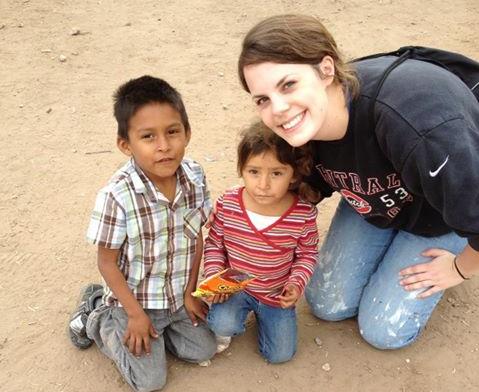By Patsy Snead ’13
An excerpt of “Country…Iowa,” written this spring for the course Literary Journalism. The essay covers Patsy’s experience teaching ELL classes in Des Moines before graduating in May.
“What country are you from?” I asked.
De, a 34-year-old Burmese refugee, sat across from me in the middle school lobby. He was here to participate in the same English-language program that his children were enrolled in at school.
After my question, De nodded, blinked. A smile tugged at the corners of his lips, then stretched across his tan, freckled skin. His dark eyes shined. He had a youthful appearance and seemed excited to be there.
“What…country…are…you…from?” I repeated the question, tugging on each syllable, hoping it would somehow solve the language puzzle in his mind.
De nodded. He smiled again. It seemed to be a smile of understanding. Instead, he stammered, “…country? Country…Iowa.” His deep brown eyes and his smile seemed to radiate. He felt proud he could offer an answer.
I had been assigned by the site director to interview him and rate his ability to speak and understand English, but all he could communicate to me was his name and the names of his two children.
He is not alone in his struggle.
At 8:45 in the morning, I walked down the long, empty hallways of the school, heading towards my classroom. Signs in both Spanish and English lined the walls. My job was an aide—I volunteered each Saturday with an English Language Learning (ELL) class for adults.
On average, we had a mixture of about 15 or so Mexican, Nepalese or Burmese adults in our class. The majority of the students spoke Karen—a language representing an ethnic group by the same name in eastern Burma.
In 1948, Burma, now known as Myanmar, gained its independence from Great Britain. The Karen nation is located on the eastern edge of Burma, along the border of Thailand. After the Second World War, the Burmese government took control of the land by force. Any resistance was regarded as a threat, which then turned into ethnic cleansing as the government fought for control of the state. The civil war continues today.
Millions of the Karen people were forced to migrate. Camps have been established in Thailand for refugees of Burma. Many countries are sharing the burden placed on Thailand by accepting relocation deals with the government for taking in Burmese refugees. Des Moines, Iowa, is one of those places.
As I continued to volunteer, I began to develop a relationship with a young woman named Tar. She seemed eager to talk to me, and her shy smiles were encouraging while we worked together. I pointed to Kerr, the studious man who always sat near her at the front of the room. “Is he your family?”
“He my…father,” she said. I didn’t want to be intrusive, and at first, I felt awkward. I wasn’t sure what to say, so I turned back to her and started with the obvious.
“So you speak Karen?”
“Yes.” She smiled and leaned in, eager to talk. “No… No English.” She shook her head and a laugh stretched across her smooth, olive skin.
“How old are you?” I asked. I expected her to be around my age. She didn’t understand, so I tried again. “I’m 21,” I pointed to myself. “How… old…are…you?”
“I’m 27,” She stated, proud of her English. Her hands gripped her chair. “Are you marry?” She asked with curiosity.
I giggled. “No, I’m not married.”
I encouraged her English skills. She had been in Iowa for seven months with her husband and three children. She began taking an English class offered at a local community college two months after her arrival. Her father had been in Des Moines for four years. He worked until his family could join him.
All of her children were born in the refugee camp where Tar had lived for the past 12 years. Many of the other students in my class, like De, came from similar camps.
Many of these ELL students were either escaping violence or looking for a better life. My work with the ELL program opened up my eyes to the kinds of challenges that educators and displaced persons alike must face. The refugees left a country full of violence, lived for years in a camp lacking access to basic resources and now live in the middle of a brand new country and culture.
They aren’t just statistics. The teachers in the ELL program provide support as the students try to break through the language barriers to reach a more hopeful future. Tar and Kerr, and thousands like them, continually have challenges to face, but they also have a desire to learn, a desire to prosper and to provide for their families.




